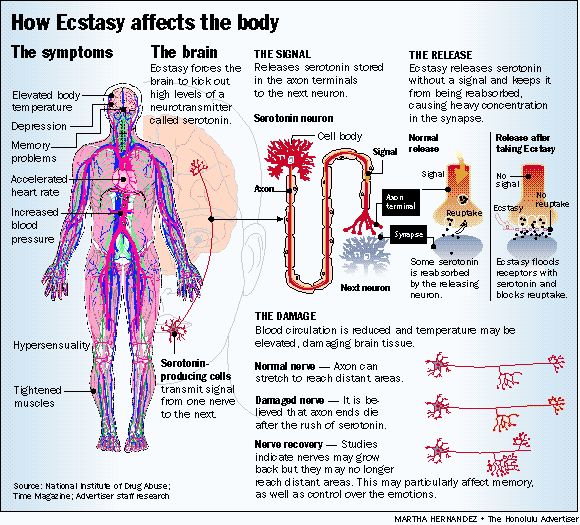Ecstasy is one of the most abused drugs here in the country, with mostly teens and young adults involved in the clubbing and rave scenes taking them to heighten their perception and experience.
What is Ecstasy?
Ecstasy is also known as MDMA, or 3,4-methylenedioxy-methamphetamine. Some also call it Molly. It is a synthetic drug that alters mood and perception of one’s surroundings. It is similar to stimulants and hallucinogens, as it produces feelings of intense pleasure, heightened energy, emotional warmth, and distorted sense of time perception.
More commonly taken in tablet or capsule form, ecstasy can also be swallowed in liquid form or snorted as powder. The nickname “Molly” came from “molecular” which refers to the pure crystalline powder sold in capsules. However, there are people who get these capsules and find that there are other drugs thrown into the mix, such as cathinones, known as “bath salts.”
Effects of MDMA or Ecstasy
Ecstasy affects the brain by activating three brain chemicals:
- Dopamine causes a surge of pleasure or euphoria and increased energy
- Norepinephrine increases the heart rate and blood pressure, thus posing a risk to people already with heart problems.
- Serotonin is responsible for mood, sleep, arousal, and appetite, among other functions. A surge in serotonin causes feelings of emotional connection, elevated mood, and deep empathy.
Other effects of ecstasy are:
- nausea and vomitting
- muscle cramps
- blurred vision
- teeth clenching
- sweating
- chills
These effects can last between 3 and 6 hours, although there are users who take a second dose right as the first dose’s effects begin to wane. Continued and frequent use of the drug, and mixing it with other drugs, can cause other effects, such as the following:
- restlessness
- irritability
- anxiety
- aggression
- impulsiveness
- disrupted sleep patterns
- memory problems
- attention problems
- decreased appetite
- decreased interest and lack of pleasure from sexual activities
And because ecstasy can increase feelings of emotional closeness and trust, especially when combined with Viagra, it can result to unprotected sex which in turn increase the risk of the user getting STDs, HIV/AIDS, and hepatitis.
High doses of ecstasy can make the body’s temperature to suddenly spike up, resulting in liver, kidney and heart failure, as well as death.



[…] those who doesn’t know, ecstasy is actually a purer MDMA, which is an active ingredient in drugs that produces a euphoric feeling that draws people to the […]